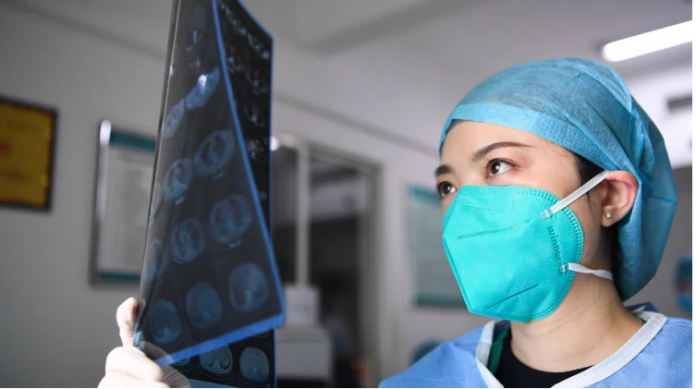- People who’ve contracted the new coronavirus are treated mainly with supportive careTrusted Source, but also medications for the flu and even some for HIV.
- Supportive care treats the symptoms — such as fever, cough, vomiting, diarrhea, and fatigue — not the virus itself.
- In the United States, there have been 11 cases so far, with the latest infections confirmed Sunday in a University of Massachusetts-Boston student as well as three individuals in California who recently traveled to Wuhan, China.
The transmission of the new coronavirus — which originated in Wuhan, China, in late December — was declared a public health emergency in the United States on Friday.
Some health officials suspect the Wuhan coronavirus may soon become a pandemic, which is defined as a health epidemic on two or more continents.
Overall, there have been more than 17,000 reported cases in 27 countries, along with more than 350 deaths, mostly in China.
In the United States, there have been 11 cases so far, with the latest infections confirmed Sunday in a University of Massachusetts-Boston student as well as three individuals in California who recently traveled to Wuhan, China.
A new travel ban also went into effect Sunday at 5 p.m. EST prohibiting non-U.S. citizens who recently traveled to China from entering the United States.
“While this virus poses a serious public health threat, the risk to the American public remains low at this time, and we are working to keep this risk low,” Health and Human Services Secretary Alex M. Azar II said in a statement.
“We are committed to protecting the health and safety of all Americans, and this public health emergency declaration is the latest in the series of steps the Trump Administration has taken to protect our country,” he said.
Though the risk is still low in the United States, health officials are working to understand how to effectively treat the infection.
There’s currently no specific treatment or cure for the Wuhan coronavirus. However, there are some interventions already showing promise, and supportive care can relieve symptoms.
Because we don’t have a targeted treatment against the new coronavirus that’s approved by the Food and Drug Administration (FDA), people who’ve contracted the coronavirus are treated with supportive careTrusted Source.
Supportive care treats the symptoms — such as fever, cough, vomiting, diarrhea, and fatigue — not the virus itself.
It helps keep people comfortable while their bodies fight off the infection, according to Dr. Margot Savoy, a practicing family physician and chair of family and community medicine at the Lewis Katz School of Medicine at Temple University.
“This can include medication treatments to reduce the fever (antipyretics [like ibuprofen and acetaminophen], cool baths), hydration, and, if necessary, respiratory support from oxygen to artificial ventilation,” Savoy told Healthline.
Keep in mind that many people who contract the coronavirus experience relatively mild symptoms and are expected to recover.
And in many cases, supportive care has been enough to get the patient back on track and avoid complications.
“This is an acute infectious disease, and there are many mild cases whose recovery mimics that of recovery from the flu,” said Dr. Amesh Adalja, an infectious disease physician and senior scholar at the Johns Hopkins University Center for Health Security.
Meanwhile, scientists are putting antivirals to the test to determine whether any might have what it takes to fight the coronavirus.
“For people who become very ill, they are using antivirals we currently use for other viral infections, and there is at least one experimental drug that was used in a case that is sparking hope for wider use,” Savoy said.
One such example are the antivirals already approved for HIV: lopinavir and ritonavir. Researchers are currently studying whether these drugs could be repurposed against the coronavirus.
Early reports say patients with the new coronavirus in Thailand improved within 48 hours of receiving the HIV treatment in conjunction with the flu medication oseltamivir (Tamiflu).
A study from 2004 showed that the HIV drugs helped people with severe acute respiratory syndrome (SARS), another coronavirus that broke out in 2002, and improved their health outcomes.
Now scientists in China are studyingTrusted Source whether the drugs will have the same effect on the Wuhan coronavirus as it did on SARS.
Furthermore, an experimental antiviral known as remdesivir that’s manufactured by Gilead Sciences “has shown some promise in laboratory-based studies against coronaviruses, and it will be important to conduct clinical trials to determine whether it is effective in patients with coronavirus infections,” Adalja said.
Remdesivir was given to the patient in Washington, the first confirmed coronavirus case in the United States. After given the antivirals, the patient’s condition improved, according to a new report detailing the case.
The drug is still being tested as a coronavirus treatment and has yet to be licensed or approved.
According to Savoy, there are about 30 medications being developed by different companies.
“Because this novel coronavirus is in the same family as the recent new infections MERS and SARS, scientists can use the work they have been doing for those infections to apply to the 2019 coronavirus,” Savoy said.
The medications will need to be studied and analyzed further before becoming a standard treatment.
Some news organizations are reporting that the coronavirus death rate is much higher than the recovery rate, but many health experts say this statistic is misleading.
Complete recovery from respiratory illnesses of any sort, including coronaviruses, can take weeks to months. Scientists are still nailing down the infection’s trajectory.
This makes it tricky to have an accurate recovery rate.
“With any new infection, when we don’t yet know how long it will take for the virus to leave our system completely, once a single person as died, the death rate can be higher than the recovery rate,” Savoy said.
Adalja agrees. He notes there are other ways of classifying whether someone has recovered or not.
“It is important to note that the definition of recovery used in the data from China includes being without fever for a number of days. That is not really a valid way to determine whether someone is recovered, as absence of fever for a short period of time may be sufficient,” Adalja said.
A better measure would be to track the number of people who are expected to survive with minimal to no ongoing complications, Savoy explains.
Savoy says it’s important to realize that most viruses don’t have a cure.
With viral infections, the goal is to avoid contracting themTrusted Source in the first place.
Vaccines help when they’re available, but proper hygiene — including frequent handwashing, avoiding contact with sick people, and cleaning infected surfaces — remain our best line of protection against harmful viruses like the new coronavirus.
Because there’s no FDA-approved targeted treatment against the new coronavirus, people who’ve contracted the new coronavirus are treated with supportive care.
Supportive care treats the symptoms — fever, cough, vomiting, diarrhea, and fatigue — not the virus itself. It helps keep people comfortable while their bodies fight off the infection.




